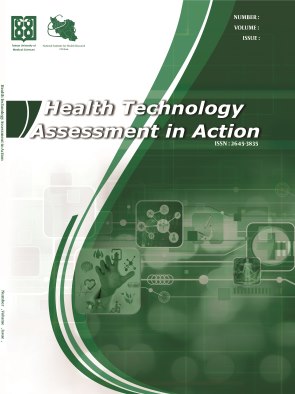Effectiveness of Acceptance and Commitment Therapy (ACT) on Individual and Social Adaptation in Adolescents with Disabled Parents
Abstract
Background: Acceptance and commitment therapy (ACT) is an emerging form of cognitive-behavioral treatment that is based on functional context.
Objectives: The purpose of this study was to investigate the effectiveness of ACT in individual and social adaptation in adolescents with disabled parents.
Methods: The research design was a quasi-experimental, pre-test and post-test, with the control and experimental groups. The study population included all female adolescents with disabled parents in Mobarakeh, Isfahan, Iran, in 2017. The sample included 30 female adolescents with disabled parents selected using the purposive sampling method. The participants were randomly assigned to both
experimental and control groups. The experimental group received ACT tests in 8 sessions, and each session lasted 90 minutes. The participants were assigned to each group before the intervention and at the end of the intervention using the California Psychological Inventory (CPI). Statistical analysis for this study was performed using SPSS-22 software for statistical calculations, and descriptive and inferential statistics were used for data analysis.
Results: According to the results, the mean ± standard deviation (SD) of the individual adaptation and social adaptation variables in the experimental and control groups during the post-test period (130.58 ± 7.88 and 128.50 ± 7.79, respectively), compared to the pre-test (44.8 ± 0.7128 and 45.5 ± 0.5128, respectively), did not increase significantly. Moreover, the results indicated that there was no significant difference in the post-test period between individual adaptation scores (F = 1.191; P = 0.288; η2 = 0.054) and social adaptation scores (F = 0.727; P = 0.403; η2 = 0.033) of the experimental group and the control group.
Conclusions:The results showed that there was no significant difference between individual and social adaptation scores in the post-test stage. This study suggests that treatment attempts were not very effective.
2. The Marjorie E. Korff Parenting At a Challenging Time Program. Russell K, Adams P, et al. [Accessed September 13, 2016];Toolkit to Help Educators Support Children of Parents with Serious Illness. 2014 http://www.massgeneral.org/cancer/assets/pdfs/MGHCancerEducatorToolkit_final_r1.pdf.
3. Lightfoot E, Hill K, LaLiberte T. The inclusion of disability as a condition for termination of parental rights. Child Abuse & Neglect. 2010 Dec 1;34(12):927-34.
4. Albert SM, Powell RM. Supporting disabled parents and their families: perspectives and recommendations from parents, attorneys, and child welfare professionals. J Public Child Welf. 2020;15(5):529. doi: 10.1080/15548732.2020.1751771.
5. Samadi SA. Comparative policy brief: Status of intellectual disabilities in the Islamic Republic of Iran. Journal of Policy and Practice in Intellectual Disabilities. 2008 Jun;5(2):129-32.
6. Sonik RA, Parish SL, Mitra M, Nicholson J. Parents with and without disabilities: Demographics, material hardship, and program participation. Review of Disability Studies: An International Journal. 2018 Dec 1;14(4).
7. Li H, Parish SL, Mitra M, Nicholson J. Health of US parents with and without disabilities. Disability and health journal. 2017 Apr 1;10(2): 303-7.doi: 10.1016/j.dhjo.2016.12.007
8. Kaplan K, Brusilovskiy E, O'Shea AM, Salzer MS. Child protective service disparities and serious mental illnesses: results from a national survey. Psychiatric Services. 2019 Mar 1;70(3): 202-8.doi: 10.1176/appi.ps.201800277
9. Slayter EM, Jensen J. Parents with intellectual disabilities in the child protection system. Children and Youth Services Review. 2019 Mar 1;98: 297-304.doi: 10.1016/j.childyouth.2019.01.013
10. Hayes LL, Ciarrochi JV. The thriving adolescent: Using acceptance and commitment therapy and positive psychology to help teens manage emotions, achieve goals, and build connection. New Harbinger Publications; 2015 Nov 1.
11. Feliu-Soler A, Montesinos F, Gutiérrez-Martínez O, Scott W, McCracken LM, Luciano JV. Current status of acceptance and commitment therapy for chronic pain: a narrative review. J Pain Res. 2018 Oct 2;11:2145-2159. doi: 10.2147/JPR.S144631. PMID: 30323649; PMCID: PMC6174685.
12. Pardede JA, Keliat BA, Wardani IY. The Symptoms of Low Self-Esteem Decline after Being Given Acceptance and Commitment Therapy. Adv Practice Nurs. 2020;5(170):10-37421.
13. Danziger S, Ratner D. Labor market outcomes and the transition to adulthood. The Future of Children. 2010 Apr 1:133-58.
14. Lightfoot E, LaLiberte T, Cho M. Parental Supports for Parents with Disabilities. Child Welfare. 2018 Jan 1;96(4):89-110.
15. Safinia G, Ebrahimi Moghadam H, Abolmaali K. Effect of Transactional Analysis Training on Communication Skills and Attribution Beliefs of Incompatible Women. Women. Health. Bull. 2021;8(3):170-178. doi: 10.30476/WHB.2021.90920.1116.
16. Hayes SC, Hofmann SG, Stanton CE, Carpenter JK, Sanford BT, Curtiss JE, Ciarrochi J. The role of the individual in the coming era of process-based therapy. Behaviour Research and Therapy. 2019 Jun 1;117:40-53.
17. Gough HG. California psychological inventory: Administrator's guide: Consulting Psychologists Press; 1987.
18. Atef-Vahid MK, Nasr-Esfahani M, Fethullah P, Shojaei, M. Standardization of the California Psychological Inventory. Journal of Psychiatry and Clinical Psychology. 2005;11:371-8
19. Saliminezhad S, Rezaei A, Azmudeh M. Comparing the Effectiveness of Acceptance and Commitment Therapy and Mindfulness Therapy on Wisdom and Social Adjustment among Aggressive Female Teenagers. International Journal of Behavioral Sciences. 2022 Apr 1;16(1).
20. Asadzadeh N, Makvandi B, Askary P, Pasha R, Naderi F. The Effectiveness of Acceptance-and Commitment-Based Therapy on Social Adjustment, Psychological Well-Being and Self-Criticism of People with Anxiety Referring to Psychological Clinics in the City of Ahvaz. Community Health Journal. 2018 Sep 23;12(3):39-47.
21. Choobdari M, Bahrainian SA, Shahabizadeh F. Effectiveness of Acceptance and Commitment Therapy and Cognitive Behavioral Therapy on Individual and Social Adaptation of Addicts. Health Technology Assessment in Action. 2022 Jul 31.
22. Soltanizadeh M, Hosseini F, Kazemi Zahrani H. The Effectiveness of Acceptance and Commitment Therapy on Social Adjustment and Self-regulation Learning in Female Students with Test Anxiety. Journal of Educational Psychology Studies. 2021 Mar 21;18(41):29-17.
23. Weil LG, Fleming SM, Dumontheil I, Kilford EJ, Weil RS, Rees G, Dolan RJ, Blakemore SJ. The development of metacognitive ability in adolescence. Consciousness and cognition. 2013 Mar 1;22(1):264-71.
| Files | ||
| Issue | Vol 8 No 1 (2024) | |
| Section | Articles | |
| DOI | https://doi.org/10.18502/htaa.v8i1.15028 | |
| Keywords | ||
| Acceptance and Commitment Therapy Social and Individual Compatibility Adolescents Disabled Parent | ||
| Rights and permissions | |

|
This work is licensed under a Creative Commons Attribution-NonCommercial 4.0 International License. |




